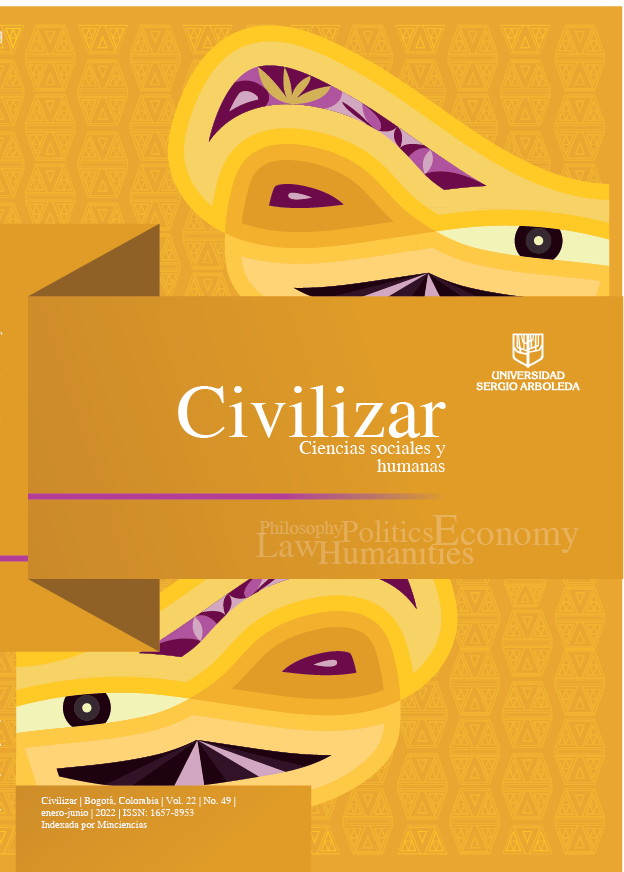Abstract
This theoretical reflection article seeks to highlight the way in which the problem of water and sanitation can be represented from the theoretical perspective of Regime Complexes. Specifically, through a qualitative research methodology, it will be indicated if the case study addressed operates as an elementary regime within a broader regime complex or whether, in turn, it represents a regime complex itself that involves an overlap of partial and non-hierarchical institutions. The relevance of this case study is manifested in the coupling of theoretical and pragmatic implications, since it is expected that deepening in the conceptual scaffolding of the theory of the Complexes of Regimes contributes to systematize the operation of multilateral institutions dedicated to water and sanitation in practice. As the main conclusion, it is noted that the water and sanitation issue is located in a blurry and overlapping border of institutional arrangements at the multilateral level, as it plays a transversal and important role within multiple dimensions of development and positions itself as a basic precondition for the fulfillment of a broad set of human rights. In this sense, water and sanitation oscillate, on the one hand, between being considered as a subject closely linked to various areas of issues on the global agenda —which therefore cannot be separated from their scope— and, on the other, representing a matter that deserves a specific treatment according to its own particularities. It is argued that these considerations can only be explained from the application of the conceptual apparatus of the Regime Complex theory.
References
ACNUDH. (2011). El derecho al agua. Folleto informativo n.º 35. https://acnudh.org/load/2018/03/FactSheet35sp.pdf
Alter, K. J. y Raustiala, K. (2018). The rise of international regime complexity. Annual Review of Law and Social Science, 14, 329-349. https://doi.org/10.1146/annurev-lawsocsci-101317-030830
Baer, M. y Gerlak, A. (2015). Implementing the human right to water and sanitation: a study of global and local discourses. Third World Quarterly, 36(8), 1527-1545. https://doi.org/10.1080/01436597.2015.1043993
Bayu, T., Kim, H. y Oki, T. (2020). Water governance contribution to water and sanitation access equality in developing countries. Water Resources Research, 56(4). https://doi.org/10.1029/2019WR025330
Biswas, A. K. (2004). From Mar del Plata to Kyoto: An analysis of global water policy dialogue. Global Environmental Change, 14, 81-88. https://doi.org/10.1016/j.gloenvcha.2003.11.003
Del Castillo, L. (2009). Los foros del agua: de Mar del Plata a Estambul 1977-2009. Documentos de Trabajo n.º 86. Consejo Argentino para las Relaciones Internacionales (CARI).
Fromageau, E. (2011). The global water partnership: between institutional flexibility and legal legitimacy. International Organizations Law Review, 8(2), 367-395. https://doi.org/10.1163/157237411X633872
García, A. (2017). Gubernamentalidad y agua: analíticas del poder en el desierto de atacama. Civilizar: Ciencias Sociales y Humanas, 17(33), 113-134. https://doi.org/10.22518/16578953.903
Guerra, S. y Pinto Moura, V. (2017). O direito humano à água: a necessária mudança de paradigma. Revista de Direitos Difusos, 67(1), 11-35.
Keohane, R. O. y Victor, D. G. (2011). The regime complex for climate change. Perspectives on Politics, 9(1), 7-23. https://doi.org/10.1017/S1537592710004068
Krasner, S. D. (ed.). (1983). International regimes. Cornell University Press.
Meier, B. M., Kayser, G. L., Kestenbaum, J. G., Amjad, U. Q., Dalcanale, F. y Bartram, J. (2014). Translating the human right to water and sanitation into public policy reform. Science and Engineering Ethics, 20(4), 833-848. https://doi.org/10.1007/s11948-013-9504-x
Naciones Unidas (1977). Informe de la Conferencia de las Naciones Unidas sobre el Agua: Mar del Plata, 14 al 25 de marzo de 1977. E/CONF.70/29. Naciones Unidas.
Neves-Silva, P., Martins, G. I. y Heller, L. (2019). Human rights’ interdependence and indivisibility: A glance over the human rights to water and sanitation. BMC International Health and Human Rights, 19(1), 1-8. https://doi.org/10.1186/s12914-019-0197-3
Raustiala, K. y Victor, D. G. (2004). The regime complex for plant genetic resources. International Organization, 58(2), 277-309. https://doi.org/10.1017/S0020818304582036
Ruggie, J. (1975). International responses to technology: Concepts and trends. International Organization, 29(3), 557-584. https://doi.org/10.1017/S0020818300031696
Salman, S. M. (2014). The human right to water and sanitation: Is the obligation deliverable? Water International, 39(7), 969-982. https://doi.org/10.1080/02508060.2015.986616
Salomón, M. (2002). La teoría de las relaciones internacionales en los albores del siglo XXI: diálogo, disidencia, aproximaciones. Revista Electrónica de Estudios Internacionales (REEI), 4(3), 2-59.
Shivakoti, R., Howlett, M., Fernandez, V. y Nair, S. (2019). Governing international regime complexes through multi-level governance mechanisms: Lessons from water, forestry and migration policy. International Journal of Water Resources Development, 37(4), 658-675. https://doi.org/10.1080/07900627.2019.1662379
Werner, A. F. (2015) Freshwater on the international agenda-emergence of a regime complex [tesis de posgrado, Instituto de Relaciones Internacionales, Universidad de São Paulo]. https://doi.org/10.11606/T.101.2015.TDE-13102015-155516
WWC (2018). Constitution & By-Laws 2016-2018: Legal document. https://www.worldwatercouncil.org/en/official-documents

This work is licensed under a Creative Commons Attribution-NonCommercial-NoDerivatives 4.0 International License.
Copyright (c) 2022 Journal Civilizar: Social and Human Sciences


